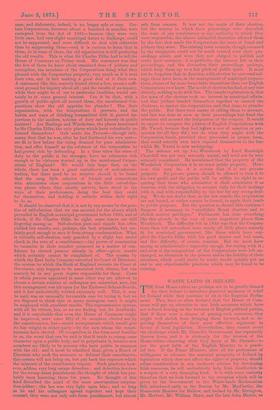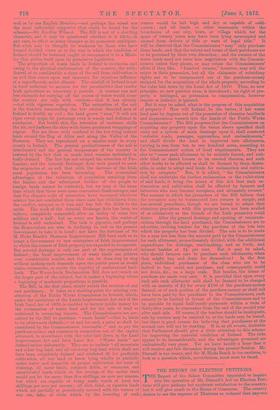WASTE LANDS IN IRELAND.
THE Irish Home-rulers are perhaps not to be greatly blamed for their failure to introduce practical measures of relief for Ireland while they continue to sit in the Imperial Parlia- ment. They have so often declared that the House of Com- mons will pay no attention to any Irish measures which have not a direct bearing on the fortunes of English political parties, that if there were a chance of passing such measures, they might well shrink from bringing them forward, and so de- priving themselves of their most effective argument in favour of local legislation. Nevertheless, they cannot avoid the challenge which Mr. Disraeli's Government has repeatedly thrown down, and it is obviously for the interest of the Home-rulers—knowing what they know of Mr. Disraeli—to put the good faith of the English Ministry to a practi- cal test. If the Prime Minister, after all his professions of willingness to advance the material prosperity of Ireland by legislation which does not affect the rights of property, should refuse consideration to any moderate scheme for developing Irish resources, he will undoubtedly help Irish disaffection to a weapon of a very damaging kind. It is with some curiosity therefore that we look forward to the reception which will be given by the Government to the Waste-lands Reclamation Bill, introduced early in the Session by Mr. MacCarthy, the Home-rule Member for Mallow, and backed by Mr. Errington, Mr. Herbert, Mr. William Shaw, and the late John Martin, as
well as by one English Member,—not perhaps the wisest nor the most influential supporter that could be found for the scheme,—Sir Eardley Wilmot. The Bill is not of a startling character, and it may be questioned whether it is likely, in any case, to effect as many changes as its promoters anticipate. But what may be thought its weakness by those who have formed decided views as to the way in which the condition of Ireland should be bettered, ought to recommend it to a Minis- try that prides itself upon its permissive legislation.
The proportion of waste lands in Ireland is enormous, and owing to the physical conformation of the country, the with- drawal of so considerable a share of the soil from cultivation is an evil that reacts upon and increases the injurious influence of a superfluously moist climate. The rainfall of Ireland is not in itself sufficient to account for the peculiarities that render Iriah agriculture so uncertain a pursuit. A warmer sun and free channels for carrying off the excess of water would cover the country not only with verdure—that it has already —but with vigorous vegetation. The saturation of the soil in the districts surrounding the low central denuded area of Ireland is doubly an evil ; the land grows "sour," it will not ripen cereal crops, its pasturage even is weedy and deficient in nutriment. But beside this, the retention of moisture chills the air, and darkens the skies with dense, persistent wrappings of vapour. Nor are these evils confined to the low-lying central lands around the Bog of Allen and along the Valley of the Shannon. They are reproduced on a smaller scale in every county in Ireland. The general productiveness of the soil is deteriorated and the general temperature of the country is lowered by the fact that so much land remains undrained or badly drained. The fact has not escaped the attention of Par- liament, and the Arterial Drainage Acts were passed to meet the exigencies of an evil that with the decrease of the Irish
rural population has been increasing. The economical advantages of the reduction of population resulting from the famine and the subsequent outflow of the people to foreign lands cannot be contested, but we may at the same time admit that there were some concurrent disadvantages, and that the climatic evils of saturation have increased wherever science has not combated them since man has withdrawn from the conflict, unequal as it was, and has left the fields to the cattle. The work of the Arterial Drainage Acts has been, we believe, completely suspended, after an outlay of some two millions and a half ; but as every one knows, the centre of Ireland is still undrained. The task is gigantic, and perhaps the Home-rulers are wise in declining to call on the present Government to take it in hand ; nor have the fortunes of Sir M. Hicks Beach's Shannon Improvement Bill been such as to tempt a Government to new enterprises of Irish improvement In which the owners of Irish property are expected to co-operate. But arterial drainage is only one part of the requirements of Ireland ; the local improvement of waste lands can achieve very considerable results, and this can be done step by step without making such demands upon the public purse as would alarm economists, or excite the cupidity of embarrassed land- lords. The Waste-lands Reclamation Bill does not trench on the larger part of the subject, but it makes a beginning where a beginning of moderate proportions is possible.
The Bill, in the first place, wisely avoids the creation of any new machinery. It takes as a starting-point the existing con- stitution of the Public Works Commission in Ireland, which, under the provisions of the Lands Improvement Act and of the Irish Land Act of 1870, is enabled to borrow public money for the reclamation of waste land and for the sale of land so reclaimed to occupying tenants. The Commissioners are per- mitted by the Bill to purchase "waste lands "—that is, lands to be afterwards defined—" at and for such a price as shall be considered by the Commissioners reasonable ;" and to pay the purchase-money and expenses in connection out of the capital advanced, in accordance with the rules laid down in the Land Improvement Act and Irish Land Act. "Waste lands" are defined rather elaborately. They are to include "all mountain and other bog land, and all cut-away bog land which shall not have been completely drained and rendered fit for profitable cultivation, all wet land or lands lying wholly or partially under water and incapable of proper cultivation for want of draining, all moor lands, common fields, or commons, and uncultivated lands which on the average of the entire tract would not let for more than five shillings an acre per annum, but which are capable of being made worth at least ten shillings per acre per annum ; all slob, tidal, or riparian lands which are partially or periodically covered with the waters of any sea, lake, or river, which by the lowering of such
waters would be left high and dry or capable of culti- vation; and all lands or other tenements within the boundaries of any city, town, or village which for the space of twenty years may have been lying unoccupied and unused from defects of title or want of legal title." It will be observed that the Commissioners "may" only purchase these lands, and that the extent and terms of their purchases are to be governed by their own discretion ; and the owners of the waste lands need not enter into negotiation with the Commis- sioners unless they please, or may refuse the Commissioners' offers if they like. "Limited owners," however, may sell the estate in their possession, but all the claimants of subsidiary rights are to be compensated out of the purchase-money assigned for the acquisition of the whole property, according to the rules laid down by the Land Act of 1870. Thus, no new principle, no new practice even, is introduced ; no right of pro- perty is infringed, no pretension to compensation, however remote or indirect, is ignored.
But it may be asked, what is the purpose of this acquisition of property How will Ireland be the better, if her waste land pass by degrees out of the possession of absentee landlords and impecunious tenants into the hands of the Public Works Commissioners? The Bill proposes that the Commissioners on acquiring any property upon the terms above specified shall carry out a system of main drainage upon it, shall construct "suitable roads, passages, approaches, and embankments," and shall divide the land so improved into allotments, varying in size from ten to one hundred acres, according to the Commissioners' notion of local requirements. They are also to "cause each allotment to be suitably fenced, and suit- able tiled or slated houses to be erected thereon and such other works to be effected as shall be deemed by them desire- able, in order to adapt said lands for reclamation and cultiva- tion by occupiers." But, it is added, "the Commissioners shall not undertake the further reclamation or the cultivation of said lands, it being the intent of this Act that such re- clamation and cultivation shall be effected by farmers and labourers who may become occupiers, and ultimately owners." The manner in which the promoters of the Bill believe that the occupiers may be transmuted into owners is simple, and has several precedents, though we are bound to admit that statutory provisions with this purpose have not been availed of as extensively as the friends of the Irish peasantry could desire. After the general drainage and opening of communi- cations through the land purchased, the Commissioners are to advertise, inviting tenders for the purchase of the lots into which the property has been divided. The sale is to be made for a sum not less than the amount paid by the Commissioners for each allotment, proportionately divided, with the additional expenditure for drainage, road-making, and so forth, and interest besides at 311- per cent. But it may be asked, why should farmers care to purchase such allotments, when they might buy and drain for themselves? In the first place, individual purchasers of the class who are to be incited to buy could not purchase, and consequently could not drain, &c. on a large scale. But besides, the terms of purchase are Made very easy. It is provided that upon every such sale each allotment sold shall be deemed to be charged with an annuity of £5 for every £100 of the purchase-money • thereof, or of such portion of the purchase-money as shall not have been paid by the purchaser to the Commissioners, such annuity to be limited in favour of the Commissioners and to be payable by equal half-yearly payments within a term of thirty-five years, to commence from the end of the second year after such sale. Of course, if the tenders should be inadequate, sale by auction may be resorted to, or the lands may be leased, but there is good reason for believing that purchasers at the normal rate will not be wanting. 11 is, at all events, desirable that Parliament should give a little attention to this scheme for improving the material condition of Ireland. The risks appear to be inconsiderable, and the advantages promised are undoubtedly very great. Yet we have hardly a hope that it will receive any fair discussion during the present Session. Mr. Disraeli is too weary, and Sir M. Hicks Beach is too cautious, to look at a question which, nevertheless, must soon be faced.



































 Previous page
Previous page